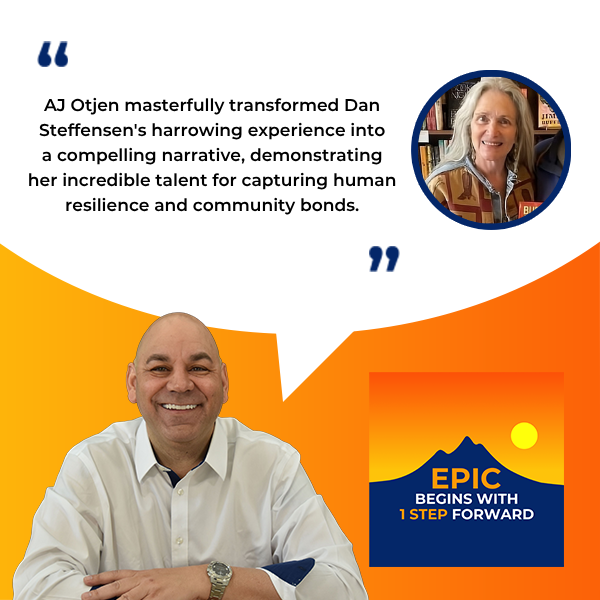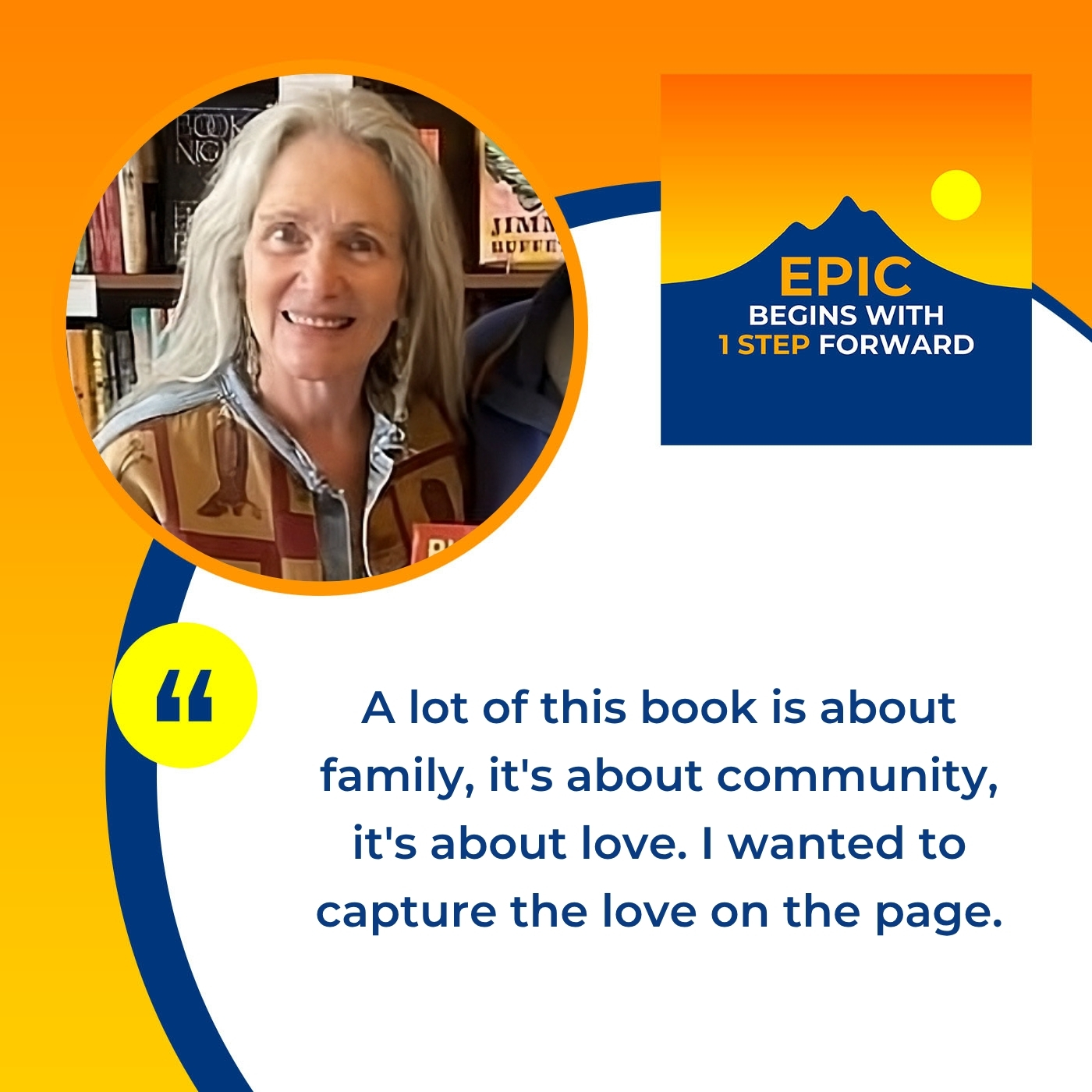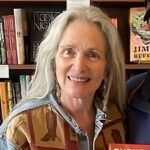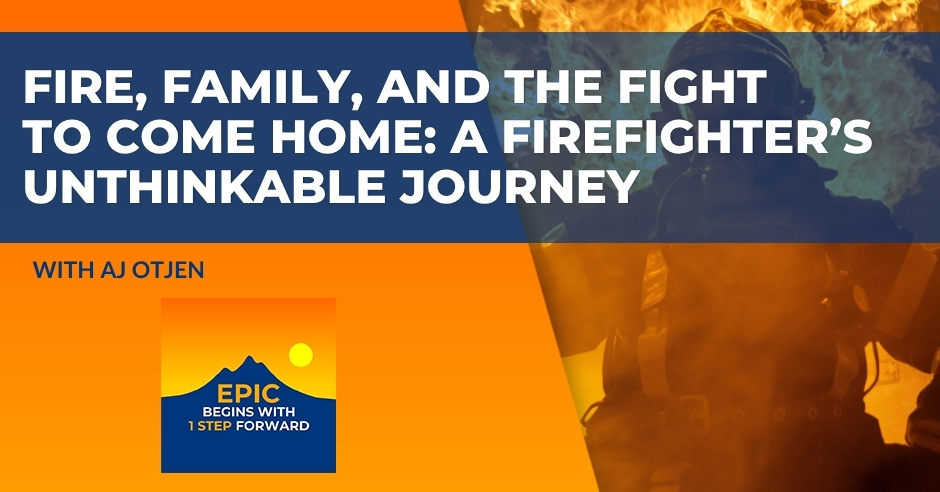Apply to be a Guest on My TV show
#EPICBeginswith1StepForward, #ZanderSprague, #BurnedOver, #FirefighterSurvival, #MontanaWildfires
—
Watch the episode here
Listen to the podcast here
Fire, Family, And The Fight To Come Home: A Firefighter’s Unthinkable Journey With AJ Otjen
I am so honored to be joined by AJ Otjen. AJ, tell us who you are and what you do.
I’m a Professor at Montana State University. I grew up in Oklahoma. I moved to Montana after my career in the corporate world of about 25 years to become a professor. I started writing academically when I became a professor and then creatively. I met Dan Steffensen and he asked me to write his story about being burned over as a firefighter.
It was a difficult experience because it was a difficult subject matter. It took about two and a half years to capture the story of Dan being burned as a firefighter and surviving, which he should not have done. Everybody prayed. His community, his family came together to bring him home. It was very important for him to come back home to his community.
That’s truly an epic story. We’ll get into it. You gave us a brief overview, but burn over is actually a term that forest fighters use. Go ahead and tell the audience what that means.
The Terrifying Tale: “Burned Over” & Dan Steffensen’s Survival
It’s the two most terrifying words that come over the radio. He said it as the fire had hit him and he didn’t realize he was hurt. Everybody listening to the radio frequency that day heard him say, “We’re burned over. We’re out of the fight. We need help.” It basically means the fire has come right on top of you and burned you over.

In his case, he and his partner who was in the engine, they were fighting a little fire, a little two foot grass fire and didn’t realize, because the National Weather Service has a delay in getting information out to the firefighters, that there was a storm about 60 miles away, a thunderstorm. In front of that thunderstorm is a downdraft of wind, about 70 miles an hour. With that wind came a wall of fire, at least 60 feet high that nobody saw coming until he just heard a train coming right at him. He turned around and this wall of fire just burned right over him. That’s what a burnover is. They happen in wildfires. When you say, “I’ve been burned over,” that’s terrifying.
Obviously, he was injured incredibly
Yeah, 60% of his body had third-degree burns. He didn’t realize it. In fact, he screamed, “Go to the black,” that’s the safety zone. That means that’s the area that’s already been burned. It’s called the black and that’s their safety escape route. He looked at Scott and said, “Go to the black.” Scott started driving the truck towards the black and Dan was right behind him. The engine was on fire and he was putting the fire on the engine out.
Scott was inside and it felt like an oven. He ended up not being hurt. He just got really hot. When they got to the black, Scott jumped out of the engine looking for Dan and Dan was just taking everything off because it was so hot. His hat, his radio harness, his belt. Everything was so hot, it was like touching an oven. His clothes started falling off because they were so burnt and he didn’t realize he was burned because the nerves are burned away. There was no pain.
The chief came over. He got on the radio and said, “We’re burned over. We’re out of the fight,” reluctantly because he didn’t want to stop fighting the fire. The chief shows up and he takes one look at him and gets on the radio and says, “Get that ambulance here now.” Dan’s like, “I’m okay. I don’t need to go anywhere. I’m fine.” His face is turning yellow and his ears are starting to flake off. He has no mustache. His hair is gone. The chief is getting more and more frantic on the radio going, “Get that ambulance here now.”
They had tried for air support, but the same storm that had blown the helicopter off the bluff that had hit Dan. There was no way they’re going to get air support to Dan to get into the hospital. They all know each other. It’s a small little county. The EMT showed up and just said, “Load and go.” She thought he was going to die on the way to the hospital. It was so bad.
Having talked to you before this interview, I’m aware that Dan, I would say he’s a true Montana man. He’s a tough cookie.
Yeah, he’s a tough son of a gun. I think I described him in the book going through three syndromes in this book. In the beginning, he was a grumpy old man. That’s a syndrome that the firefighters have. When they’re not fighting fires and they’re sitting around in the firehouse, it’s the grumpy old man syndrome. That is what they call it.
He was even more so because the woman in his life, Marnie, had passed away a year before this incident. He was definitely a grumpy old man beforehand. When he was going through the recovery of the burn, he was considered a tough old bastard because the workman’s comp guy who paid all the bills from Montana was looking at all these surgeries and all this wound care and he just said, “This man must be a tough old bastard.” That was a tough old bastard syndrome.
Later, as he was going through PT and wound care with the nurses, he hated every minute of it. He wouldn’t do what they said. He said, “I’m not hurt,” grumpy. They said that he was a stubborn old fool. I called that the stubborn old fool syndrome. He needed all three of those things, grumpy old man, tough old bastard, stubborn old fool to get through this and survive because. He’s the first one to say, “I am who I am. Take me or leave me.” He didn’t use this word, but he admitted that he was a jerk. “That’s just who I am.”
It would seem to me that with that amount of injury, you would have to be a tough, stubborn bastard too. You’d be like, “I’m not going anywhere.” I’m going to guess that perhaps he was also a little grumpy that he couldn’t be out fighting fires.
Horribly grumpy, because he had worked forever. He had trained so hard. He became a firefighter late in life. He had trained so hard. He was now a senior firefighter. He was naturally qualified. He was a trainer, a mentor to so many of the people in the firehouse. Red Lodge, the town, is such a small town, such a tight community that he was basically beloved by everybody in town.
Red Lodge had such a bad summer. It was called the Summer of Hell. Still remembered that way because it started with a very bad fire that had come over the mountains and come right to the edge of town where they were about to evacuate the town. A hiker, a graduate of Montana State University, had gone up hiking and then didn’t come back down.
They had had search and rescue out looking for her all summer long. Dan got burned and then another firefighter, a very talented snowboarder, had fallen off of a skateboard and hit his head and then he ended up on life support and then he eventually died. They were all saying, “Dan, you’ve got to live. You’ve got to come home to us. You’ve got to heal from these burns.”
He had been flown to Utah, to Salt Lake City, and was in a coma for 24 days. Now the town was saying, “Dan, you’ve got to come home to us. You’ve got to live. We cannot take any more tragedy. You’ve got to come home.” He was so important to the town and him living and getting through this ordeal of all the burn recovery, they prayed for him every day. They needed him to come home. That’s when I realized how important that was, that’s when I realized that this book had to be good. This story had to be told. He was as tough as they needed to be. They all said, “We’re fortunate that he’s so tough, that he was the one that went through this or we would we would’ve lost him too.”
That decision to write a book, I certainly know deciding to write a book seems easy enough, “I should write a book,” but then then, the reality quickly sets in that writing a book isn’t as easy. It would seem to me that trying to get Dan’s story might have been challenging for you.
Hard as hell, I would say. It was Dan’s idea. People kept saying, “You ought to write a book, Dan.” He agreed, but he didn’t think he knew how. I met him when my students were doing a marketing campaign for the personal protective equipment that he was wearing which saved his life, basically, the Nomex material. He ended up being the star of our ad campaign saying, “Please help raise money so that all firefighters can survive like I did.” I met him on that shoot and he had read a couple of other books I’d written and he said, “Would you write my book?” I’ve never written a nonfiction novel before. How do you say no to a burned-over firefighter who wants to tell a story?
Everybody volunteers for the fire department. I thought, “I guess I have no choice.” It took us two and a half years and it was incredibly difficult because he’s difficult and he doesn’t share his feelings. He wanted it to be a fire book. As I got more and more into it, I said, “This isn’t a fire book, Dan. This is a very human story.” That meant he had to open up a lot, which he did not want to do.
He cried a lot, telling the story. I cried a lot and I interviewed 50 people and they all cried a lot. I had to do a lot of research to learn about firefighting and training and weather and radio frequencies and burn healing and medicine in hospitals. I probably rewrote it twenty times to try to get it right. It was really difficult I knew I had to finish it, though, because he kept telling everybody his book was coming out. I was like, “We’re going to get it done.” It was his decision. I said yes, but we stuck it out and then got it done.
Were there days, AJ, when you thought, “Why did I say yes?”
So many. He says we butted heads. I would say we fought. We fought really hard. I remember there were two weeks when we didn’t speak to each other and I thought, “How are we ever going to finish this book?” We would get so mad at each other and then we would hug it out and cry and say, “Okay, we can keep going.” After it was finished and we were doing the tour promoting it, somebody said, “Was it a lot of fun writing this book?” We both went, “No, it was not fun writing this book.”
“Fun would not be the adjective I would use.”
No, but we became incredibly close. There were times when we just hated each other. We were still very close. I think we always, to this day, trusted each other. There’s a lot of trust. He told everybody, “No one knows me as well as AJ knows me.” That’s true to this day because he told me things that he hasn’t told anybody. Not and not all of it’s in the book, thank God. We had to be that close for me to understand who he is, how he got into this position, why he was estranged from his family and how that was so important that they all came running as soon as they got the call that he had been burned.
Firefighter families go through a lot. They take in a lot. His family had never experienced being a firefighter family until this happened. All of a sudden, the very worst thing that can happen is what happened to them. Now they’re all in Utah going, “I guess we better let bygones be bygones and all come together to save this man.” That’s what happened. A lot of this book is about family, it’s about community, it’s about love. I wanted to capture the love on the page. How to do that, I had to really try to become a narrative writer, which I wasn’t. That took me a lot of learning to learn how to become a writer.

The Road To “Burned Over”: Navigating Detours & Discoveries
That’s an epic journey for you, and like any epic journey, there are the roadblocks. We won’t name any particularly large ones, Dan.
I can look back and laugh at it now.
Exactly, or detours. You think you’re going down one way and all of a sudden, you’re like, “Hold on, here’s this detour that we have to go down.” Perhaps it’s the family relationship. Maybe it’s a story that he chooses to share with you that all of a sudden, you’re like, “Now this gives us a new color to put into the book. How do I get this in?” I know in writing my books that it’s like, what to include, what not to include. It’s clear in my mind, but is it clear on the page?
I would have so many parts of it written and then I wouldn’t know how to start. The first chapter was one of the hardest things to write because it was like how do I start this thing and give it a foundation so that the readers get an idea of where this is, who everybody is, who Dan is, just to get it started. I had to let everybody know how close everybody was, how grumpy he was and how beautiful Red Lodge was all in the first chapter. I had to set that much of the stage in the first chapter.
Firefighter families go through a lot. They take in a lot.
Obviously, because you teach marketing, you’re more so fully aware of, “I’ve got to grab them at the beginning so they’re interested and will listen and will read on.”
To get the backstory in and make it interesting in the first chapter, I found so daunting. It’s like, “The backstory is so boring but how do I make it so that something good’s coming?” I tried to make Red Lodge beautiful in the first few paragraphs and let them know something really scary is coming about this beautiful place. It took me a while to figure out how to make the first page and the first paragraph Interesting enough to keep going.
Readers, if you know you’ve thought of writing a book, oftentimes what happens is, especially in a narrative story like you’re talking about, AJ, the first chapter is actually the last thing written, because now you have the whole story. You are like, “Here’s what I need to put in.” You don’t sit down and go, “Here’s my first chapter,” because you don’t have the whole story. You don’t know what do I want to tease? How do I put it together? You’re right. You’re like, “This is a fascinating story, but how do I begin this?”
I thought I had a couple of times, but when I went back and looked, I had a terrible beginning or a terrible opening. I rewrote that thing probably twenty times and I really didn’t have it until I understood how important the Red Lodge community was and how important it was for him to come home. Once I got grasped that and interviewed so many people from Red Lodge, then I felt like I had it. I went back and I rewrote the entire book, pretty much making the hook be Red Lodge was hurting and he had to come home to Red Lodge. That became the story for me. Here’s Red Lodge, here’s Red Lodge fire. Here’s this one guy within all of this. It was at chapter six when I finally said, “One of them is on fire,” and then it was all about getting him back home.
That was the structure of the whole story. It was poor Red Lodge. Beautiful Red Lodge, family of Red Lodge. Somebody got burned and how does he come home? That became the structure of the story because the firefighter community is so close and Red Lodge is made up of firefighters, or the family of firefighters. They sit right on the edge of Yellowstone Park, surrounded by forest and fuel. They all stay on alert during fire season. That’s what they’re trained to do. They had never had anybody get burned over before. This was huge for them. It was just so emotional for all of them.
Fall in love with a town, fall in love with a subject, fall in love with everything about it, so that you can feel the pain, feel the emotions.
Have you found that the fire season seems to have grown longer?
Yes. Absolutely. It used to be like July, August and September and now it’s May to October easily.
Basically, if it’s not snowing, it could be fiery.
If it’s not snowing, it’s burning. That’s Montana.
For you, AJ, what have been 1 or 2 areas that you found that you grew or you discovered about yourself in doing this project?
Lessons Learned: Authenticity & Community In Storytelling
I found that I opened up more to people and to having emotions myself and having relationships as well. I made a lot of friends through this book. Burn survivors, the people in Red Lodge. It is about an hour from where I live, so now I have a lot more friends in Red Lodge. Firefighters, the firefighter community. I feel like I’m a part of it now. It’s a fantastic community. I felt like I was opening up to the emotions of their emotions and making friends with them and trusting to have good connections, so I probably was much more closed off like Dan. Not as bad as Dan, but in that direction. I learned that that’s not the way to be, that you really need to open yourself up to love more. I think that’s one of the things that I learned through this process.
Somebody asked me, “What’s the key to writing a good book?” I say, “I think it’s important to fall in love with your subject matter. Fall in love with a town, fall in love with a subject, fall in love with everything about it, so that you can feel the pain, feel the emotions because you’re never going to get any of that right on the book if you’re just not in there, if you’re not involved with everything about the story.
Your authentic voice can’t come through if you are not writing from a place of authenticity. Good writing is good writing.

I tried.
I get you. I took the attitude when I got done writing my books. I’m like, “There it is,” because I’ve said what I want to say, how I want to say it. Any author will tell you that perhaps the hardest part, it’s not the actual writing, but it’s the editing of the book, because you start to second-guess. “Have I said that right?”
I read it now and I think, “On the second printing, I’m going to change this and change that.” I see lots of things I want to change on the second printing. It’s not typos. It’s like, “I think I could have written that line better. I could have written that line better.” I have to admit that I really like the ending, only because I was inspired by it when Dan, when he was fighting fires in 2023, he did make it back on the fire line two years after he was burned. He fought so hard. He sent me a picture. That’s how tough he is.
In 2023, he was fighting fires in the Western part of the state. He sent me a picture of his new engine. They have a fondness for engines and he always thought Engine 78 or E78 was his engine, which he burned over right in the fire. They got a new E78. He sent me a picture of the new E78 that he had in Western Montana. I said, “Is that the new E78?” He said, “Yeah.”
That inspired me for the ending, which I won’t tell everybody, but I wrote it and I sent it to him and he said, “I’m crying.” I said, “Yeah, me too.” I made him cry for the end of the book. Every once in a while, there’s a page where I imagined a scene to sum it all up. That always made me feel so feel like I came up with something. One scene here too that was creative license to fill in the gaps to set the story unfold.
The editing of the book, there comes a point where you’ve read your book through, you’re doing the proofreading and stuff. I don’t know about you, AJ, but I certainly got to a point where I really don’t want to read my book again for just a little bit because I’ve just read my book like six times. You’re just going through, maybe you decide to change this sentence or whatever. You’re trying to make sure that you and the other eyes looking are trying to find if there are any punctuation problems. Did you forget a comma, a semicolon, whatever? There comes a point where you’re like, “Okay, it’s fine. It’s good enough.” We want perfection.
Mine has a bibliography in it because I quoted Hemingway or Jimmy Buffett in places. I have a bibliography, which had to be exactly right. The publisher made me go over that bibliography teb times to make sure it was right. That was one thing. The footnotes, the bibliography, that took another month to make sure it was right. The publisher did provide a really good editor and a really good proofreader. That helped. That proofreader found so many things that were off and like you said, quotation marks, periods. I’m like, “You’re good.” The bibliography is always difficult because as colons and page numbers. That helped a lot.
There comes a point where you’ve read your book so much that you know what you want to say. There are times where afterwards, it comes out and then you realize that you miss something. You and the proofreader, you all missed something. In part, that’s a psychological thing of you’ve read it so often, you know what you’re saying, you know how it goes. Your eye skips over the fact that you’ve forgot a colon or a quotation mark or whatever. You’re like, “There’s a quote,” it’s an open-ended quotation. You’re like, “How did we miss that?” It happens because you spent so much time with it that you become blind to it because you know what it is.
You can see it too many times. That’s right.
AJ, remind people what the name of the book is and where they can get it.
It’s called Burned Over: The Survival of Montana Firefighter Dan Steffensen. It’s available on Amazon, in Kindle, Audible and in print. You can find out more about it on my website, which is AJOtjen.com. It’s all there with all sorts of links to Audible and everything.
AJ, I want to thank you so much for joining me. Such an epic conversation.
Thank you for your time. I really appreciate it.
Not a problem. I want to remind everyone that if you’re ready to begin your epic journey, go to EpicBegins.com. As always, remember, epic choices lead to the epic life that you want.
Important Links
- AJ Otjen
- Burned Over: The Survival of Montana Firefighter Dan Steffensen
- Burned Over: The Survival of Montana Firefighter Dan Steffensen on Amazon
About AJ Otjen
 Author A.J. Otjen is a 2023 Library of Congress Award-Winning author, and Montana firefighter Dan Steffensen offers a gripping firsthand account of survival, courage, and the power of community in the face of unimaginable tragedy.
Author A.J. Otjen is a 2023 Library of Congress Award-Winning author, and Montana firefighter Dan Steffensen offers a gripping firsthand account of survival, courage, and the power of community in the face of unimaginable tragedy.
Your audience will gain insights into the harrowing world of wildland firefighting, the physical and emotional challenges of burn recovery, and the extraordinary strength of the human spirit.
Otjen and Steffensen’s story is a testament to the unbreakable bonds forged in times of crisis and the profound impact of community support on the path to healing.

